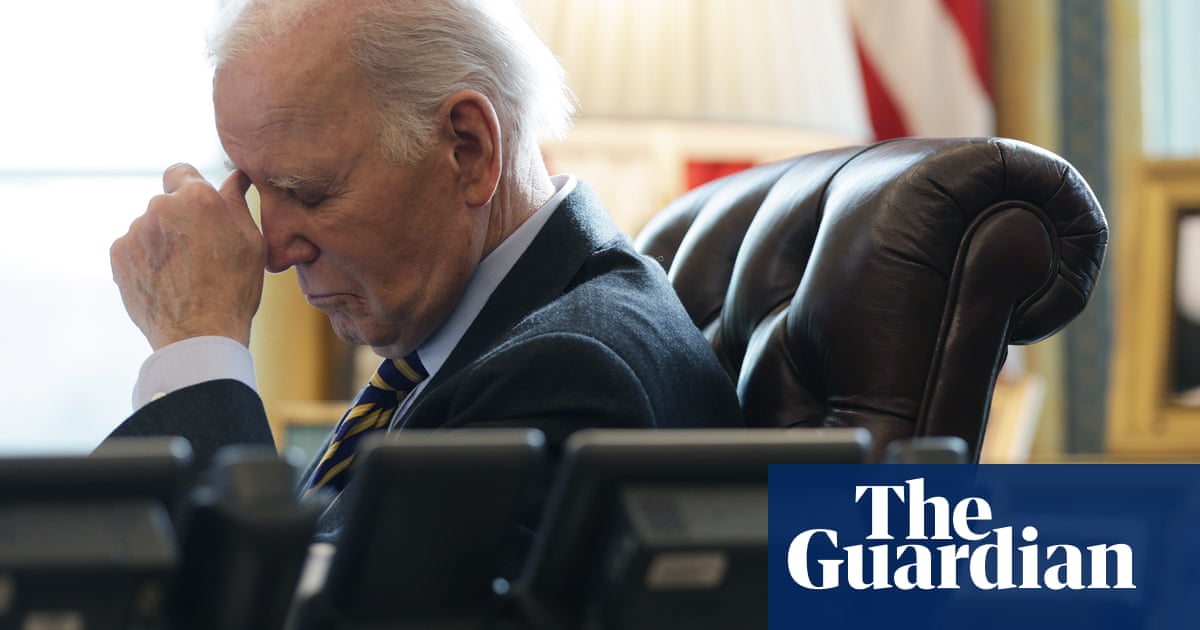When Hasan Piker was stopped and questioned about his political views by US Customs and Border Protection (CBP) agents at Chicago’s O’Hare airport last Sunday, the popular leftwing streamer thought he knew exactly what their motive was. “Obviously the reason for why they’re doing that is, I think, to try to create an environment of fear,” he told his legion of fans on a Twitch stream in which he described his ordeal. “To try to get people like myself … to shut the fuck up.”
But the decision by Piker – a 33-year-old US citizen – to entertain the agents’ questions for nearly two hours has some of the self-described socialist’s fans and allies questioning why he didn’t do just that.
“DONT YAP TO COPS,” read one comment on Piker’s Twitch stream as he told the story live on Monday. “Bro get a lawyer next time dawg,” read another. Others deployed the peculiar argot of Twitch chats, with comments reading, “CHAT KNOW YOUR RIGHTS DinkDonk” and “YOU DON’T HAVE TO SPEAK TO THESE PEOPLE CHAT, YOU HAVE THE RIGHT TO REMAIN SILENT DinkDonk”. (DinkDonk is a custom emoji featuring Pepe the frog hitting itself in the head with a bell – an exclamation somewhere between “duh” and “wake up!”.)
The backlash continued as word of Piker’s detention garnered international headlines. (CBP confirmed Piker was stopped for inspection but denied that he was targeted for his political beliefs.) The veteran tech blogger Mike Masnick criticized Piker for giving his fans “a masterclass in what not to do when detained by CBP” on TechDirt, writing: “While CBP’s behavior was egregious, Piker’s response was potentially even more dangerous … With his massive platform, he’s teaching millions of followers exactly the wrong lesson about dealing with law enforcement – that if you’re clever enough, privileged enough, or ‘experienced’ enough at handling conflict, you can somehow talk your way through it. This is exactly the kind of thinking that leads people to waive their rights and incriminate themselves.”
i got stopped by cbp at global entry for additional questioning. i’m out it wasn’t that bad. very strange experience overall though. https://t.co/pWlKt6kQGL
— hasanabi (@hasanthehun) May 11, 2025Lefties on social media began recirculating the National Lawyers Guild’s perennially viral “know your rights” video. The PSA-style clip features longtime civil rights attorneys Bill Goodman and Denise Heberle, gray-haired and respectable looking, sitting behind a silver tea service like a pair of friendly antifa grandparents delivering important legal advice to the next generation if they find themselves in the custody of law enforcement: “There’s one thing that hasn’t changed over 50 years, something that is so important to tell you kids that are new to this movement: shut the fuck up.”
Piker’s detention comes at a fraught moment for critics of the US government. Since resuming power, the Trump administration has attempted to place the country’s immigration enforcement apparatus into overdrive. Reports of lengthy detentions and even deportations of visa holders at airports have proliferated; the French government complained that a French scholar was denied entry in March after CBP agents found anti-Trump messages on his phone. The government is even attempting to deport green card and visa holders over their pro-Palestinian activism.
Piker checks many of the boxes for apparent targets of Trump administration repression: he is young, leftwing, outspokenly critical of US policy on Israel and the Middle East, and of Turkish descent. He is also hugely influential among young people and fiercely anti-Trump. But crucially, he’s a native-born US citizen, which means he enjoys all of the constitutional rights generally covered in “know your rights” hearings.
Piker was not unaware of this kind of advice, which has been standard “security culture” practice among leftwing activists for decades. He responded to criticism in the chat as it poured in, exclaiming, “Dude, what are you talking about? I know that under normal circumstances I’m supposed to say I want a lawyer … But this is – nothing I’m doing is illegal and I also wanted to see what would happen … Instead of immediately lawyering up I was like, ‘No I’m going to entertain this. I’m going to see what they actually are trying to get out of this.’”
But Ría Thompson-Washington, the president of the National Lawyers Guild and an attorney who regularly leads “know your rights” trainings for activists around the country, said that it was a common misstep for people who know their rights to fail to exercise them. “Everybody thinks that knowing your rights is about being able to argue with the police about what your rights are,” they said in an interview. “When you’re in police custody, the things that you say that you think are proving you right – the things that you say that you think are disproving whatever narrative the police have told you that they’re running with – it’s just used against you later.”
Asserting one’s right to stay silent during an encounter with government agents is intimidating, and Thompson-Washington says that they recommend people rely on a few choice phrases to guide their interactions, such as asking, “Am I being detained?” upon being approached by a police officer. If the answer is yes, they say, ask for a lawyer and then remain silent. If the answer is no, walk away and remain silent.
“When you ask that question, it lets the police officer know that you’re aware that you don’t have to say anything,” they said. “You’re signaling to the officer that you’ve at least had training.” And indeed, Piker said that he was finally allowed to leave shortly after he asked whether he was being detained – after about two hours of questioning. “I probably should have asked, ‘Am I being detained?’ from the start,” he said on the stream.
Piker went on to say that he would not have allowed CBP to search his phone or laptop, and he advised his fans on how to disable FaceID before interactions with law enforcement officials. He has also since endorsed the idea that his fans should “NOT do what he did” if they are questioned by law enforcement officers.
But the incident and its fallout shines a spotlight on an increasingly urgent question for citizens of the United States during the second Trump administration: what are your rights at the border (or airport – Piker flew into Chicago from France) and how and when should you exercise them? And why do veteran anti-fascist activists advise against speaking with law enforcement?
For US citizens accustomed to the protections of the first, fourth and fifth amendments, the border can present an unexpected legal gauntlet. (The situation is even more fraught for visa and green card holders.) Constitutional protections against unreasonable searches and seizures do not apply in full at the border, explained Nathan Freed Wessler, deputy director of the ACLU’s Speech, Privacy and Technology project, because the supreme court has ruled that the government has an overriding interest in preventing certain people and objects from entering the country. This is why the government can search your baggage without a warrant or individualized suspicion when you re-enter the country, something that would be forbidden elsewhere in the country.
CBP has the authority to verify your citizenship and ask basic questions about your travel and the items you are bringing into the country, Freed Wessler said. Further questions – especially about first amendment protected areas such as political and religious beliefs or associations – are not appropriate and do not need to be answered. CBP can also perform a “manual” search of your devices, though they cannot compel you to provide a passcode, which is why Piker was correct to advise people to turn off biometric access to devices before travel.
But despite the limited purview of CBP’s authority at the border, it has frequently exceeded it, Freed Wessler said, subjecting citizens to “much more invasive questions, including sometimes about people’s religious practice, their political beliefs, who they were spending time with on a trip”. The ACLU has pending lawsuits against the government over allegations that CBP has systematically targeted Muslim Americans and journalists for questioning at the border; the organization’s work on the practice dates back to 2010 – long before Trump took control.
Many citizens may feel, as Piker did, that they have done nothing wrong and have nothing to hide, but there are still downsides to answering questions. The information will become part of “an indelible record” held by CBP, Freed Wessler noted, which could then be shared with other government agencies, who might use it to inform who is included on government watchlists or for other intelligence-gathering activities.
Freed Wessler got a glimpse into the extent of those activities when the ACLU took depositions from CBP and Ice officials in the course of its litigation. “Under oath they talked about how they could take a request from another law enforcement agency to search a phone,” he recalled. “They could search a US citizen’s phone while trying to gather information about a non-citizen relative. They could search a phone of a business person to try to gather information about someone else they do business with who’s being investigated.
“The same goes for questioning,” he added. You cannot know the motive for the government’s questions – or who they are investigating.
That is why it’s so important for activists to stick to silence, according to Thompson Washington. Even if you think, as Piker did, that you are not vulnerable and haven’t done anything wrong, you might not be the target of a government fishing expedition.
“People need to remember that your best defense is being in solidarity with people and movements that are making systemic change, and that the way we are in solidarity with each other – just a very minor way – is making a collective agreement not to speak to police about anything … because anything that I might say could be used and likely will be used against somebody else,” they said.
“If they come for me at night, they’re going to come for you in the morning,” they said. “And when they come for me, I’m gonna shut the fuck up, period.”

 5 hours ago
6
5 hours ago
6

















































